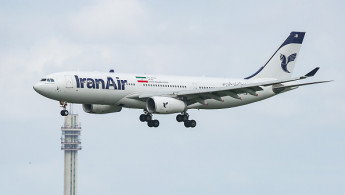Former foes Iran and UAE bolster ties with aviation agreement
Iran and the UAE signed air transport agreements on Thursday in a sign of warming relations between the two regional rivals.
The two countries agreed to boost air links and tourism opportunities, following visits to key Gulf countries by Iran Foreign Minister Hossein Amir-Abdollahian, UAE state media reported.
The Iranian FM capped off his Gulf tour with a visit to Abu Dhabi on Thursday, meeting UAE President Sheikh Mohamed bin Zayed Al-Nahyan and his Emirati counterpart Abdullah bin Zayed Al-Nahyan in a bid to bolster relations.
This includes the inking of an agreement between the heads of the UAE and Iranian civil aviation authorities, Mohammed Al-Suwaidi and Mohammad Mohammadi Bakhsh, at the General Civil Aviation Authority (GCAA) headquarters in Dubai, on air links.
UAE media said this was part of Abu Dhabi's open-skies policy and should bolster trade between the two countries.
Iran's aviation industry has been hugely affected by US sanctions, with around half of its civil fleet grounded. Earlier this year, Iran ramped up cooperation with Russia, which is also under crippling Western sanctions, to repair civilian aeroplanes.
Iranian airliners have been accused of shipping weapons and fighters to Iran's proxies and allies in the region, which Tehran denies.
They are also key to flying Iranians to Muslim pilgrimage sites in the Middle East, including Mecca which hosts Hajj next week.
The UAE and Iran have experienced shaky relations in recent years, particularly over Tehran's nuclear programme.
Despite continued trade, UAE-Iranian relations have hit several lows over the past decade.
Houthi rebels in Yemen, viewed as proxies of Iran, have targeted Abu Dhabi in missile strikes while ships bound for the Gulf state have also been hit.
A normalisation agreement between the UAE and Israel in 2021 did little to soothe tensions.
A perceived lack of support by the US for its Gulf allies has seen in a shift in regional policy by Abu Dhabi and Riyadh with an apparent emphasis on ending tensions in the Arab world and focusing on economic growth and stability.
This includes agreements with Iran's allies in the region - such as the Syrian regime and Houthis in Yemen - along with Tehran, in moves that appear to have mostly taken the US by surprise.





 Follow the Middle East's top stories in English at The New Arab on Google News
Follow the Middle East's top stories in English at The New Arab on Google News
![The UAE is widely suspected of arming the RSF militia [Getty]](/sites/default/files/styles/image_330x185/public/2024-11/GettyImages-472529908.jpg?h=69f2b9d0&itok=Yauw3YTG)
![Netanyahu furiously denounced the ICC [Getty]](/sites/default/files/styles/image_330x185/public/2024-11/GettyImages-2169352575.jpg?h=199d8c1f&itok=-vRiruf5)
![Both Hamas and the Palestinian Authority welcomed the ICC arrest warrants [Getty]](/sites/default/files/styles/image_330x185/public/2024-11/GettyImages-2178351173.jpg?h=199d8c1f&itok=TV858iVg)